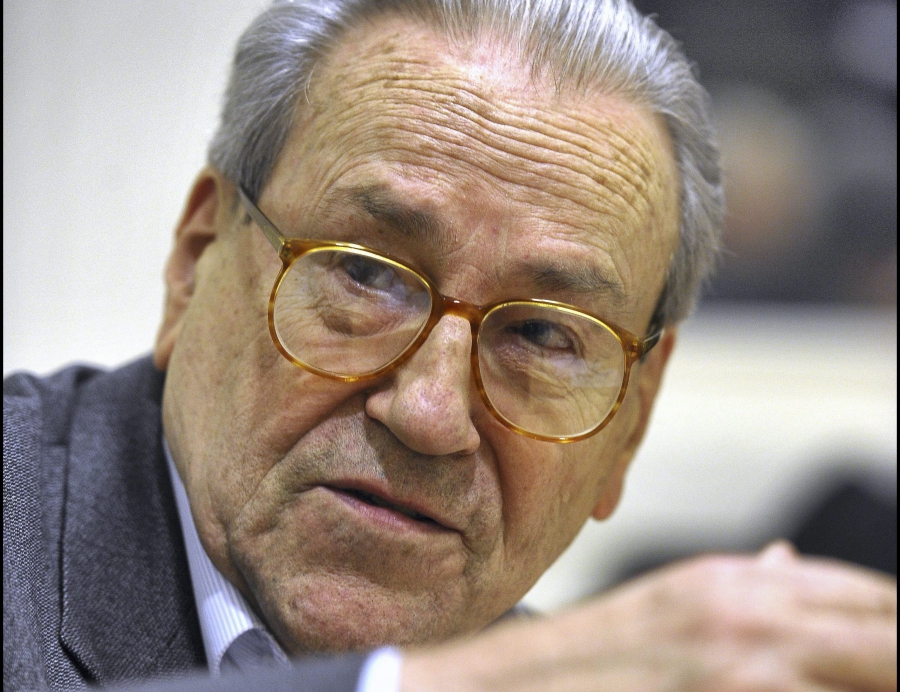Scholars: Marxism retains critical role in society

French philosopher Lucien Sève
The contributions of Marx to philosophy are undervalued by today’s academics, said Lucien Sève, a renowned French philosopher and former director of the Éditions sociales in a recent interview with L'Humanité.
Marxism in Europe
Discussing the publication of Philosophy?—the third volume of his four-part series titled Thinking With Marx Today, Sève said that the importance of Marxist philosophy should be acknowledged in the same way that the relevance of Marxist political economics was affirmed by the subprime crisis.
According to Sève, the relationship between Marx and philosophy has yet to be fully discussed in France, and there is still a serious misunderstanding of Marxist philosophy within French society and academia.
Emmanuel Renault, a professor from the Department of Philosophy at Université Paris Ouest Nanterre La Défense, noted that Marxist philosophy has been constantly researched and developed in Europe, as exemplified by Ceorg Lukacs, Antonio Gramsci and Marx Horkheimer.
After World War II, Marx became a research object of numerous philosophers, such as Maurice Merleau-Ponty, Jean Paul Sartre, Jurgen Habermas and Michel Foucault, who focused their attention on the special influence of Marx’s works on philosophy.
After the 1970s, however, with the decline of Eurocommunism, philosophy not directly related to Marx gradually gained ground. In the early 1980s, European intellectuals even began to turn their back on the far-reaching impact Marx exerted on philosophy. Only recently has Marxist philosophy begun to see a revival owing to the efforts of young scholars.
“Unlike other philosophers, who were eager to break through philosophical concepts created by their predecessors and develop new paths, Marx not only paid heed to breaking the mental block of traditional philosophy but also attached importance to exploring the real world,” said Renault, illustrating that Marx pushed the limits of Benedictus Spinoza’s theories and proposed that philosophers must stop viewing problems “with a consistent perception.”
Undervalued Marxism
Sève claimed that for various reasons, Marx failed to turn categories and concepts he frequently used into theoretical topics, which to some extent led to the undervaluation of his contribution to philosophy.
In this regard, Feng Yanli, a research fellow with the Department of Foreign Marxism at the Academy of Marxism at the Chinese Academy of Social Sciences, holds a different view.
From his standpoint, the main reason that Marxist philosophy is undervalued lies in Marx’s argument that “philosophers have merely interpreted the world. The point is to change it.”
By offering a theory means to change the old world and create a new one, Marxist philosophy encourages people to revolutionize the world through practice, thereby opening up possibilities of establishing a new political structure. It is this fundamental ideological difference from mainstream Western theories that resulted in the undervaluation of Marx’s achievements in philosophy.
Feng emphasized that it is not acceptable to separate Marxist theories if we want to correctly evaluate Marx’s contribution to philosophy. It is essential to regard Marxist philosophy, political economics and scientific socialism as a whole. “Surplus value” and “historical materialism,” two major contributions of Marx, are likewise inseparable, he said.
Criticalness core to Marxist philosophy
With regard to the theoretical contribution of Marx as a philosopher, French academia is indeed divided. First, starting from Karl Raimund Popper, Western academics identified Marx with Plato and Hegel and classified him as an absolutist, which is partly why Marx and his philosophy are left out.
Second, when elaborating on his own ideas, Marx adopted interdisciplinary methodologies. In economics-related studies, in particular, an inaccurate understanding of philosophical theories will pose the risk of rendering Marxist philosophy empirical. In other words, Marx was reduced to a social scientist with an accurate understanding of the economic architecture of modern society. As such, the inherent critical nature of Marxist philosophy has dissipated and so has its inherent philosophical dimension.
“Criticalness is the defining feature of Marxist philosophy, because its core spirit is not to build another philosophical system, but to criticize philosophy per se,” said Xia Ying, an associate professor at the Department of Philosophy at Tsinghua University.
The fact that Marx considered philosophy to be a target of criticism was the result of the age in which he lived, she added. Marx lived in a post-Hegelian era, when the massive speculative philosophical system established by Hegel encompassed each and every aspect of life, which brought about nothing but sheer speculative theories and political conservatism.
After 1844, labor movements picked up steam in Europe. Revolutions required philosophy to respond to the new era and provide theoretical backing and ideological guidance. However, scholasticism had come to a dead end. At this moment, Marx’s criticism of Hegelianism represented a new philosophical model.
“To understand Marx’s contribution to philosophy, we must focus on maintaining the intrinsic criticalness. This is an uncompromising dialectical attitude that deems all as temporary. It shores up and dominates all political and economic research by Marx,” said Xia.
